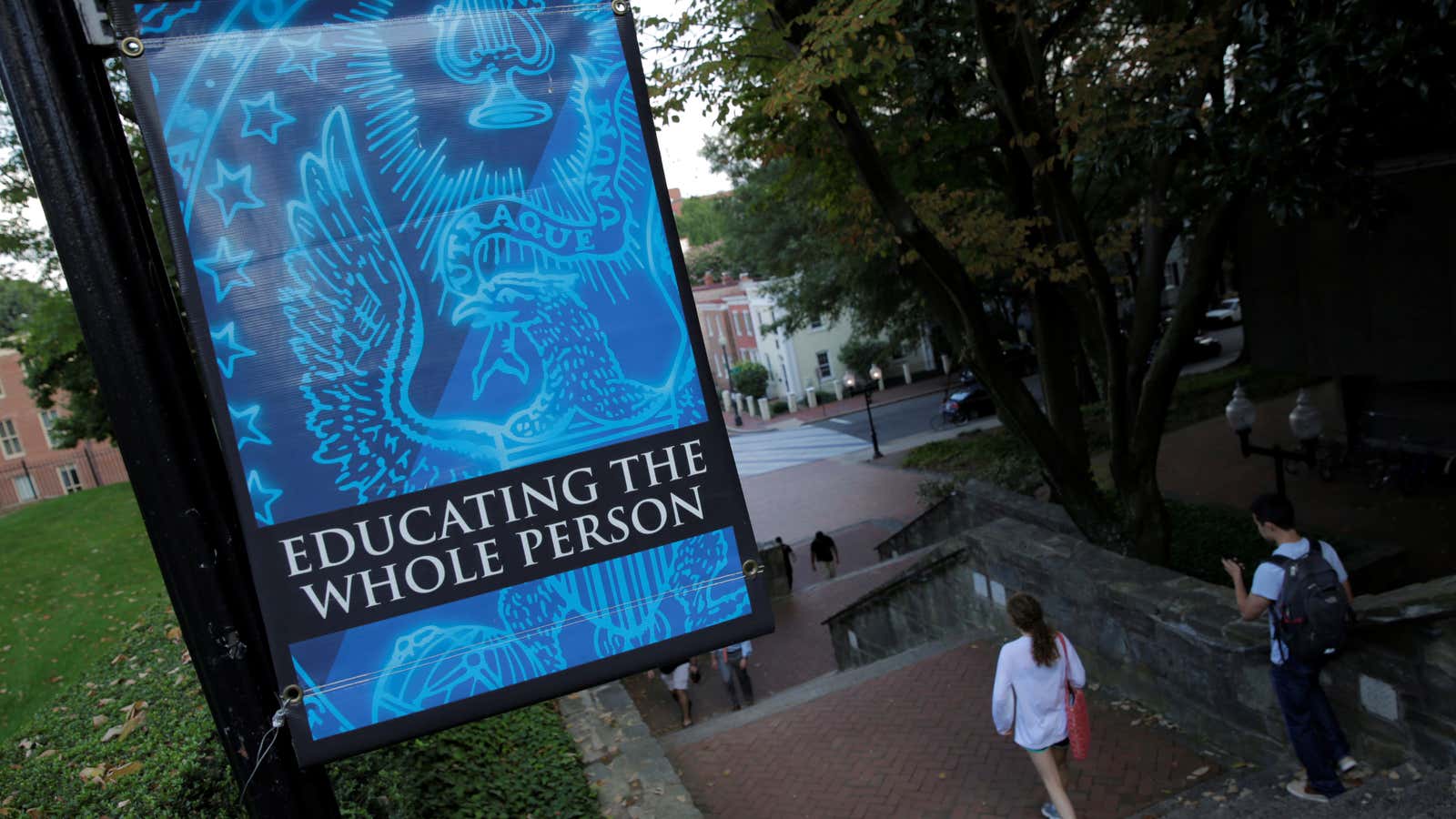Any parent who spent hundreds of thousands of dollars to cheat their kid into prestigious universities clearly lost and destroyed their moral compass long ago. Their children—those who benefitted from the teaching—represent a slightly more complex ethical question. How much moral weight do teenagers bear for going along with the criminal activities of their parents?
One huge mitigating factor is whether or not they knew. No students are charged in the case; the US Justice Department said it hadn’t targeted children in the investigation, though US Attorney for the District of Massachusetts Andrew Lelling noted at a press conference that some could potentially face future charges. Incredibly, it seems many were earnestly unaware of their nefarious means of acceptance. The college prep company Edge College & Career Network, also known as “The Key,” arranged to cheat the students’ tests, in some cases by correcting their scores after they’d completed the exams, or by having someone else take the test in their place. “How do you do this without telling the kids what you’re doing?” one parent asked a member of The Key according to a transcript included in the indictment. “She’s smart, she’s going to figure this out.” The transcripts also show that one student was completely unaware that his parents had fraudulently arranged his acceptance to the University of Southern California as a track athlete. In a call to one of the organizers of The Key, his mother explains there was a “glitch” at orientation when an advisor asked about her son’s track running, and he honestly replied that he didn’t run. These students, who benefited from the cheating but did not partake in it, are not morally culpable for their parents’ actions.
Others, though, surely did know. The criminal complaint notes that, according to a member of The Key who cooperated with the FBI, he “gloated” with one student, Isabelle Henriquez, who was fraudulently accepted into Georgetown, about having got away with the cheating.
“To the extent they know about it, they’re responsible,” says Rivka Weinberg, professor of philosophy at Scripps College in Claremont, California. “They’re 17, 18 years old, that’s not that young. They know they’re doing something wrong.” As teenagers, they have immature judgement and so, both legally and morally, are less culpable than their parents, notes Weinberg. They still have enough judgement to be responsible.
But what if their understanding of ethics is shaped by their immoral parents? “Adults are responsible for what they should know, not just what they do know,” says Weinberg. “Children should know fewer things and to a lesser degree. But most children should know that cheating is wrong.” Even if their parents taught them that cheating was ok, the teenagers should know better.
Anthony Skelton, a moral philosopher at the University of Western Ontario who’s an expert in children’s wellbeing including questions of consent, notes that a teenager’s responsibility would be diminished slightly in a case where they merely go along with their parents’ immoral actions, rather than instigating those same actions on their own.
There’s also the factor of just how much pressure teenagers face from their parents. Children are, to some extent, dependent on their parents and therefore vulnerable, notes Skelton. Some parents do coerce their children—whether to study hard and get good grades, or more dubious activities such as going along with a cheating scam. “If the parent says we won’t help you financially or we won’t associate with you, it’s much less likely they’d be able to resist,” says Skelton.
The influence of parents makes a huge difference in nearly all students’ college applications. Expensive tutoring and extensive college prep are just some of the acceptable ways that parents can drive their kids’ success in ways that aren’t fraudulent but nevertheless contribute to a hugely uneven system. Within the context of parents perpetually levering privilege to help their kids get ahead, cheating on tests could seem just like part of a crooked scheme. Some parents donate millions for university buildings, or pull in connections who know the dean, or encourage their kids to apply to schools where they’ll be a legacy. But while it’s not always clear where to draw the line, it’s clear that outright cheating crosses every moral boundary.
For those who were completely unaware, what duty do they have now? “Morally speaking, I don’t think an innocent student who benefited from their parents cheating them in would be required to drop out,” Isra Black, lecturer in law at York Law School in the UK, writes in an email. (He notes he discussed his thinking with Skelton and Lisa Forsberg, postdoctoral fellow in law and philosophy at the University of Oxford.) But they might want to make a reparation, he notes, such as donating towards a fund for marginalized groups. “Prudentially speaking, that is, from the point of view of their own good, they might wish to drop out, to avoid any lingering doubts,” he adds. Growing up, after all, necessitates moving away from parental mandates and deciding on the kind of person to become.
